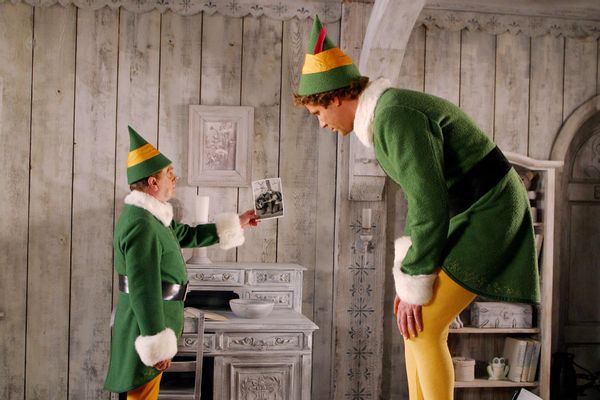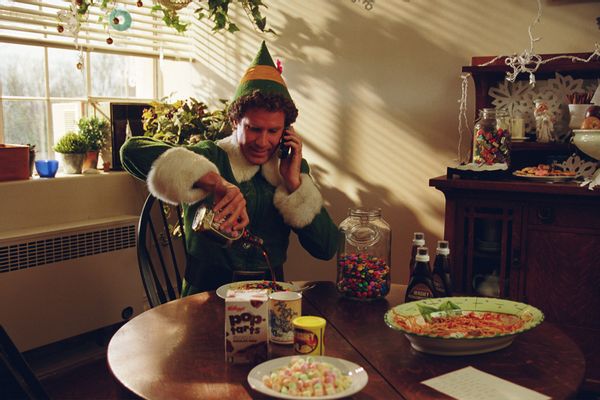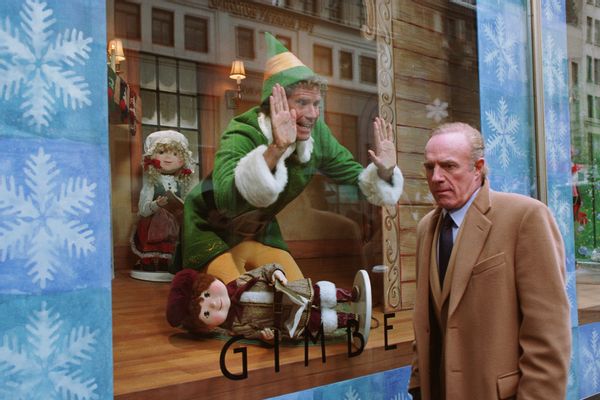20 years on, “Elf” reminds us that it’s OK to not feel secure in our adulthood
Over the last 20 years, I’d like to think that America as a whole has become a collective of “Elf” aficionados. The film’s culty, Christmastime appeal has solidified it as a canonical holiday classic, melding memorable quotes with comedy and feel-good charm. There aren’t many Christmas movies that my family will quote on a year-round basis. And yet, we often find ourselves reminding each other that ribbon curls should be six inches, “honey.” Or accusing one another of sitting on a throne of lies and smelling like beef and cheese.
We, as adults, may often feel as lonely, confused and out of place as we did in our youth.
But iconic quotes aside, “Elf” finds its enduring appeal — at least for those of us who no longer believe in Santa Claus (but will always believe in the Christmas spirit, damnit!) — for its honest depiction of adulthood: nebulous, half-formed and something that we are certainly uncertain about.
I was five years old when “Elf” was released on Nov. 7, 2003. The movie was filmed in New York City in 2002, shortly after the nation had been deeply shaken by the terrorist attacks of Sept. 11. As my mother, a 9/11 survivor, has often pointed out, shimmers of national solidarity are evident in the film’s inclusion of American flags. The extent to which the film is a response to a sobering nation in need of an ostensible, cinematic pick-me-up is something I won’t endeavor to determine. Nonetheless, the film’s tugging at this certain thread undeniably lends to the way some viewers may interpret its reputation and significance years on. Setting that aside, Manhattan as “Elf”’s primary setting embodies a sort of gritty honesty and adultness that sets the film apart from its far mushier Hallmark contemporaries, which tend to over-dramatize love, relationships and other aspects of reality.
What “Elf” more directly addresses, through the character of Buddy the Elf (Will Ferrell), is a sort of uneasiness surrounding adulthood. In the film, Buddy is an orphaned human who through an accident, ends up in the North Pole and raised by Santa as an elf. But once grown, he learns the truth of his parentage and is tasked with getting his human bio dad – corrupt publishing exec Walter Hobbs (James Caan) – off the Naughty List with a dose of Christmas spirit.
 Bob Newhart as Papa Elf and Will Ferrell as Buddy in “Elf” (New Line Cinema/Hulu)Buddy’s rocky journey of embracing the human world and his own place in it earnestly illustrates the sense that we, as adults, may often feel as lonely, confused and out of place as we did in our youth. What most of us don’t say out loud, Buddy does, through his childlike naivete.
Bob Newhart as Papa Elf and Will Ferrell as Buddy in “Elf” (New Line Cinema/Hulu)Buddy’s rocky journey of embracing the human world and his own place in it earnestly illustrates the sense that we, as adults, may often feel as lonely, confused and out of place as we did in our youth. What most of us don’t say out loud, Buddy does, through his childlike naivete.
After landing in New York and making contact with his estranged father, Buddy attempts to please him by assimilating into the world of corporate Manhattan. Walter rejects Buddy’s proposed Etch A Sketch-drawn itinerary, which includes some of his favorite and most commonplace activities during his time at the North Pole. “First we’ll make snow angels for two hours, and then we’ll go ice skating, and then we’ll eat a whole roll of Toll House cookie dough as fast as we can, and then to finish, we’ll snuggle!” he says, looking something like a medieval minstrel in a bright green elf suit, yellow tights, and point-toed shoes. Christmas curmudgeon Walter is not on board, believing his son is a “certifiably insane” man living under the deranged delusion that he is an elf. Walter even tries to get Buddy to ditch his yuletide ensemble. “You’re not in the North Pole any longer,” he says. “Look, you want to make me happy, don’t you? Then lose the tights.”
Much to his chagrin — and Emily Hobbs’s (Mary Steenburgen) surprise — Buddy sheds his sugar-plummed regalia in favor of a suit and briefcase and accompanies his father to work at Greenway Press, a children’s book publishing firm. While at the office, Buddy tries coffee (which he hates) and works in the building’s shiny mailroom. “This place looks like Santa’s Workshop!” he says. “Except it smells like mushrooms, and everyone wants to hurt me.” Buddy even inadvertently gets drunk when another worker shares “maple syrup” with him, which leads to a mailroom-wide dance party.
 Will Ferrell as Buddy in “Elf” (New Line Cinema/Hulu)Though Buddy has put on the trappings of adulthood, inside he’s still the same whimsical dude, a fact which is glaringly apparent to the viewer as we watch him wholesomely and haplessly blend with his new world. This tension is the crux of what “Elf” addresses. Does anyone actually know what’s going on? Is there a right or wrong way to live our lives? Why can’t I seem to fit in? Why does it seem like everyone else has it all figured out, has their sh*t together? Santa’s Workshop vs. Corporate America? “The Cut”’s Kathryn Jezer-Morton recently touched on this idea by analyzing parental insecurities to get at a shared fundamental anxiety with how we are publicly perceived. Though Buddy is far from hung up on what others think of him (in fact, he is blissfully unaware of social norms), his journey of demystification from perceived elfhood to humanness ultimately mimics the process of becoming an adult.
Will Ferrell as Buddy in “Elf” (New Line Cinema/Hulu)Though Buddy has put on the trappings of adulthood, inside he’s still the same whimsical dude, a fact which is glaringly apparent to the viewer as we watch him wholesomely and haplessly blend with his new world. This tension is the crux of what “Elf” addresses. Does anyone actually know what’s going on? Is there a right or wrong way to live our lives? Why can’t I seem to fit in? Why does it seem like everyone else has it all figured out, has their sh*t together? Santa’s Workshop vs. Corporate America? “The Cut”’s Kathryn Jezer-Morton recently touched on this idea by analyzing parental insecurities to get at a shared fundamental anxiety with how we are publicly perceived. Though Buddy is far from hung up on what others think of him (in fact, he is blissfully unaware of social norms), his journey of demystification from perceived elfhood to humanness ultimately mimics the process of becoming an adult.
Towards the end of the film, Walter becomes irate when Buddy foils a business partnership between Greenway and children’s book author Miles Finch (Peter Dinklage), confusing the writer who has dwarfism for a rather “angry elf.” Not only does Miles grow increasingly grow angry, but he beats up Buddy before storming out of the office.
Walter has had enough and tells Buddy to leave. “I don’t care where you go,” he fumes. “I don’t care that you’re an elf, I don’t care that you’re nuts, I don’t care that you’re my son. Get out of my life — now!”
 Will Ferrell as Buddy and James Caan as Walter in “Elf” (New Line Cinema/Hulu)After a heartbroken Buddy departs, we see him sitting in the Hobbs’ apartment, furiously twisting the Etch A Sketch’s knobs as he pens an apology letter. “I’m sorry I ruined your lives and crammed [11] cookies into the VCR,” he writes. “I don’t belong here. I don’t belong anywhere. I’ll never forget you. Love, Buddy.” Even the ornery and Scrooge-like Walter can’t help but become emotional at reading that. Buddy is soon cast into a deep state of emotional limbo, unsure of himself and his place in life. I won’t speak for everyone, and although I wasn’t raised as a Christmas elf, I’ve spent much of my adulthood experiencing these same thoughts and feelings.
Will Ferrell as Buddy and James Caan as Walter in “Elf” (New Line Cinema/Hulu)After a heartbroken Buddy departs, we see him sitting in the Hobbs’ apartment, furiously twisting the Etch A Sketch’s knobs as he pens an apology letter. “I’m sorry I ruined your lives and crammed [11] cookies into the VCR,” he writes. “I don’t belong here. I don’t belong anywhere. I’ll never forget you. Love, Buddy.” Even the ornery and Scrooge-like Walter can’t help but become emotional at reading that. Buddy is soon cast into a deep state of emotional limbo, unsure of himself and his place in life. I won’t speak for everyone, and although I wasn’t raised as a Christmas elf, I’ve spent much of my adulthood experiencing these same thoughts and feelings.
It can also serve as a reminder to us adults . . . to not take ourselves, or life for that matter, too seriously.
But when Buddy witnesses Santa’s sleigh erratically cutting across the sky on Christmas Eve in a state of apparent malfunction, he springs into action, returning to his elfin roots to save the day and stoke Christmas spirit amongst hardened New Yorkers. Buddy clings to the back of Santa’s newly airborne sleigh, waving to his family below, signaling us to see that this is the world he belongs in.
Certainly, the end of “Elf” can be taken at face value for what it is: a big red bow tied around a film that, at its core, is about the holidays. But it can also serve as a reminder to us adults, no matter what generation we identify with, to not take ourselves, or life for that matter, too seriously. To remain true to our most authentic selves, a lesson which, although a cliche platitude of sorts, is something I think we could all benefit from. Sure, adulthood carries along with it some inherent roles and responsibilities. But not all of them are humdrum and grey-suited. Nor are they aspects of our adultness that we should (or shouldn’t) feel secure in. Though “Elf” doesn’t advocate for us to act like kids outright — and perhaps even advises us against combining pasta with Pop-Tarts and candy — it reminds us that it’s perfectly acceptable to be in flux, evolving and wondering where our lives will carry us, even if we’re already in the middle of them.
And no, you definitely don’t have to drink coffee.
“Elf” is now available to stream on Hulu and is in select theaters for its 20th anniversary.
Read more
about this topic

